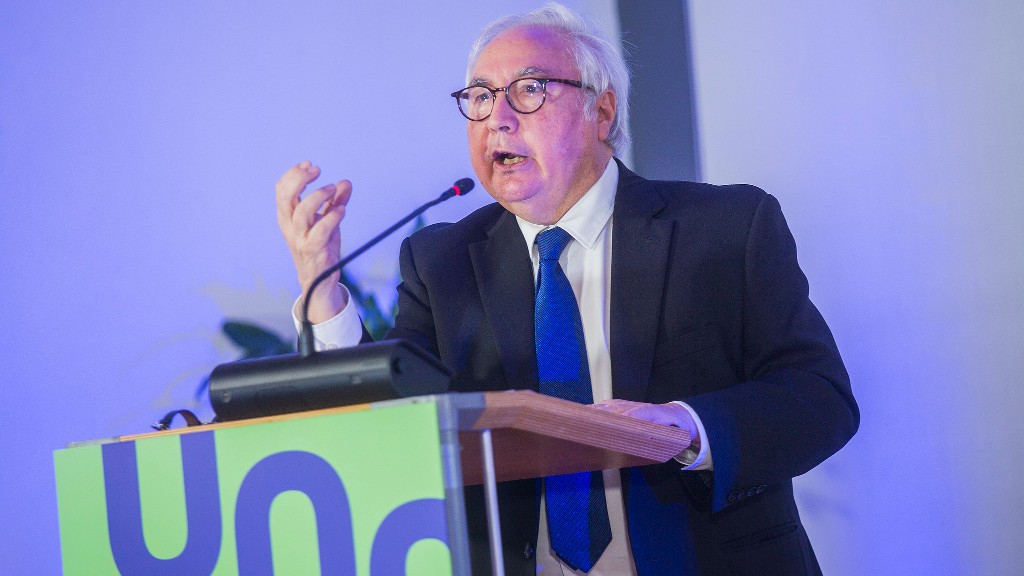Manuel Castells, Spanish Minister for Universities, celebrates the 20th anniversary of the UOC's first research centre specializing in ICT
The Sociology professor was the director of the UOC's Internet Interdisciplinary Institute (IN3) from 2008 to 2013 and carried out pioneering research, including Project Internet Catalonia
The Internet Interdisciplinary Institute (IN3), the research institute of the Universitat Oberta de Catalunya (UOC) that specializes in the study of the internet and the effects of the interaction of digital technologies with human activity, is celebrating its 20th anniversary. Manuel Castells, Spanish Minister for Universities and Professor of Sociology at theUOC, was the IN3's director from 2008 to 2013. To commemorate the anniversary, he will give a talk on “The Network Society in the Age of Pandemics” on 3 June at 6 p.m. at the University's headquarters (Av. Tibidabo, 39, Barcelona). The event, which will be conducted entirely in English, will be streamed live from this link.
The IN3 currently plays host to 11 research groups with a wide variety of interdisciplinary projects, but at its inception, in 2000, it only had the pioneering Doctoral Programme in Information and Knowledge Society, which was one of the first to be created in the field of the information and knowledge society and the first to be offered entirely online. And just one year later came the start of the first phase of the Project Internet Catalonia (PIC), an ambitious study that analysed the characteristics and development of the information society in Catalonia until its completion in 2007 under the leadership of Professor Castells.
Castells took over as the director of the IN3 in 2008 and set new strategic lines. It was during this period that he received the prestigious Holberg Prize, which is considered to be the Nobel Prize of the social sciences, art, technology, humanities and law (2012), and the Balzan Prize for Sociology, which distinguishes scientists from all around the world for their contributions to the sciences and the arts (2013).
The IN3's current director, David Megías, reviewed the history of the institute. “The IN3 was created during the 1999-2000 academic year with the aim of carrying out cutting-edge research into the network society, that is, the interaction between digital technologies—essentially the internet—and the various scopes of human society. Today, with renewed terminology, we can say that the IN3 researches the digital transformation of society.” This research is conducted “thanks to the confluence of disciplines that are in principle worlds apart, such as the social and human sciences on one hand and ICT engineering on the other,” he added. For Megías, “interdisciplinary collaboration between these two major blocks allows us to not only analyse how society is being transformed, but also participate in this transformation with the aim of contributing to the progress of humanity, playing our part in making what Professor Castells prophesized come true.”
Professor Castells will give a talk to commemorate the IN3's 20th anniversary
The main event of the celebration, titled “The Network Society Today: (Revisiting) the Information Age Trilogy”, will be the talk “The Network Society in the Age of Pandemics,” given by Castells. It will be followed by a roundtable moderated by Marina Garcés, a philosopher and member of the UOC's Faculty of Arts and Humanities, analysing the work done by Manuel Castells and its present-day implications. The roundtable's participants will be Diana Roig Sanz, an ICREA IN3-UOC Research Professor and European Research Council grant recipient; John Thompson, Professor of Sociology at the University of Cambridge and Emeritus Fellow at Jesus College (Cambridge); Fernando Calderón, Professor at Argentina's Universidad Nacional San Martín (UNSAM) and Latin American Faculty of Social Sciences (FLASCO); Ida Susser, Distinguished Professor of Anthropology at Hunter College and the CUNY Graduate Center; Felix Stalder, Professor of Digital Culture at Zurich University of the Arts, and Hana Jalloul, expert on radicalization and its relation to identity.
The event coincides with the 25th anniversary of the publication of the first volume of Professor Castells' The Information Age: Economy, Society and Culture, one of the most influential works on the social changes brought about by the rise of the digital revolution in recent decades. “It is a pioneering work because it established the foundations of the concept of the network society and the information age and influenced a whole generation of academics, setting the research agenda,” explained IN3 researchers Mireia Fernández-Ardèvol and Ramon Ribera-Fumaz.
Press contact
-
Editorial department
